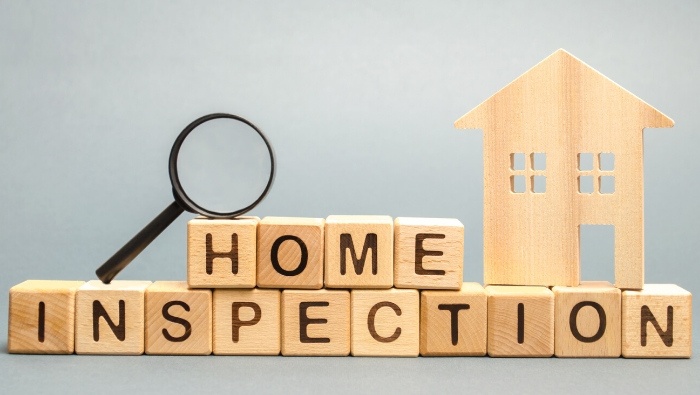Get a Home Inspection Before Listing Your Home For Sale

When selling your home, you’d like to get top dollar. Read on to find out how spending a few dollars for an inspection before listing your home could increase your selling price.
You’ve heard the saying that sometimes you have to spend money to make money. It’s not a popular one in the frugal community where we’ll save every penny, nickel, and dime because they add up to dollars. However, that might not be the best plan of action when it comes to big-ticket items like your home.
Even in a seller’s market, your house must still present well if you want top dollar. But, how do you know what to repair or replace? Some things are obvious like the cabinet door that perpetually swings open or the missing tile in the shower. But others aren’t. Some major issues are electrical, HVAC, foundation, roofing, and plumbing.
He went on to share, “Electrical issues would be in my top couple of items I come across during an inspection. GFCI (ground fault circuit interrupters) are required for all exterior and garage outlets, as well as within six feet of all water sources on the interior of the home. That means GFCIs are required for all outlets in the kitchen and bathrooms as well. This is a safety issue, and an issue I’ve seen buyers (especially younger buyers) get scared off by. These safety devices have been around since about 1970 and code requirements have changed several times since then. So, if you’ve been in your house for a few decades, this is something you’ll want to have up-to-date before selling your home.”
Sign Up for Savings
Subscribe to get money-saving content by email that can help you stretch your dollars further.
Twice each week, you'll receive articles and tips that can help you free up and keep more of your hard-earned money, even on the tightest of budgets.
We respect your privacy. Unsubscribe at any time.
A pre-listing inspection is a great way to be several steps ahead when you decide to put your home on the market. It might seem like wasted money because the buyer will usually want another inspection. However, think about the advantages, especially if you are selling it without a realtor and need an extra measure of assurance for the buyer.
Proactive Planning
When you know what could be revealed in a future subsequent inspection, you can complete those repairs now to avoid the issue or perhaps offer a credit upon closing if you don’t have the funds to do it now. It also allows you to adjust the timing of your listing for the best possible showings.
Kinrade advises, “By knowing the potential issues or repairs ahead of time, the seller can choose to fix them or leave them for the buyer to address. But if you leave anything other than cosmetic issues for the buyer, I recommend having three quotes from qualified contractors so the buyers know the cost ahead of time, or better yet, have those things already repaired or upgraded. That fosters openness and transparency that can help the seller stay in charge of their listing price, and it shows the buyer you aren’t trying to hide anything.”
Transparency Matters
As Kinrade noted, this also promotes transparency, which may resonate with a buyer. This was an extra step you didn’t have to take and could reveal problems they may not have ever discovered, but now they have a certified inspection and documentation of repairs to give them peace of mind.
Don’t Even Go There
Some buyers aren’t handy at repairs or are perhaps first-time homebuyers, and they may overreact to the sight of the easily remedied imperfections. Don’t give them that opportunity.
Your Agent Will Thank You
Your listing agent will be better able to advise you as to which improvements and repairs are worth your while and will serve to support or increase your listing price. They also will be able to negotiate more effectively on your behalf because they know the true condition and value of your home.
You Never Know
It’s a long shot, but the buyer may decide to accept the inspection you’ve presented to them and not order their own. Your transparency and honesty may set you apart as a seller they can trust.
The price of a home inspection will vary in different areas of the country and with different inspectors. Be sure to choose a reputable, certified inspector. If an inspection price seems too high, contact others for comparison. As Kinrade concluded, “A pre-listing inspection is such a small price to pay to stay in the driver’s seat, and it is a win-win for both the seller and buyer.”
Reviewed April 2023
Wouldn't you like to be a Stretcher too?
Subscribe to get our money-saving content twice per week by email and start living better for less.
We respect your privacy. Unsubscribe at any time.
Popular Articles
- 7 Habits of Highly Frugal People
- 5 Simple Budget Cuts That Can Save $200 a Month
- How to Track Down Unclaimed Funds Owed You
- 32 Ways to Save Money on Your Utility Bills
- Do You Need Credit Life Insurance When Buying a New Car?
- How to Maximize Profits When Selling Online
- Staying Motivated to Continue Digging Yourself Out of Debt
On After50Finances.com
- 9 Things You Need to Do Before You Retire
- You Didn’t Save Enough for Retirement and You’re 55+
- When Empty Nesters Reorganize and Declutter Their Home
- Reinventing Your Career in Your 50s or 60s
- What Mature Homeowners Should Know about Reverse Mortgages
- 2 Reasons to Collect Social Security Benefits As Soon As Possible

